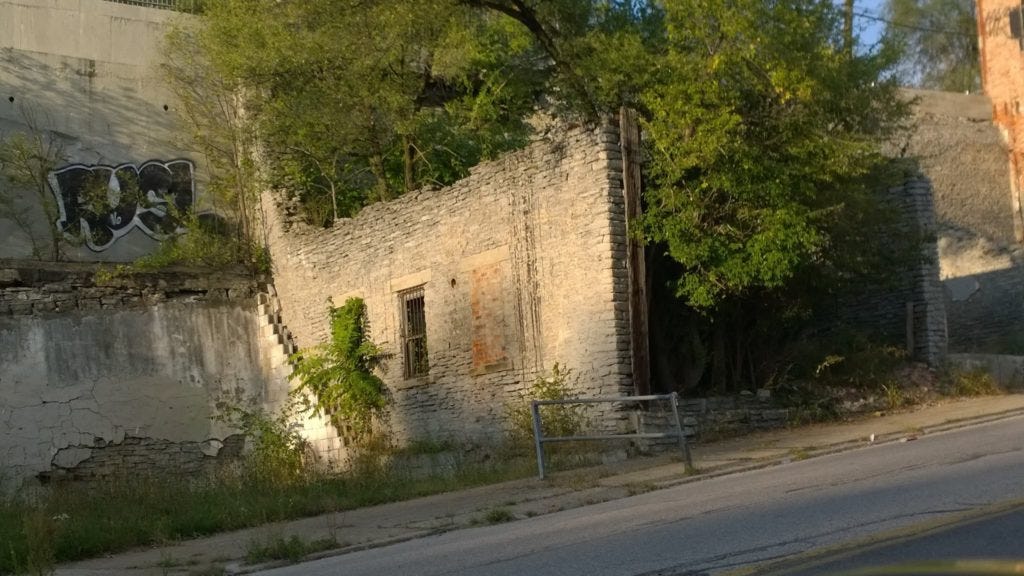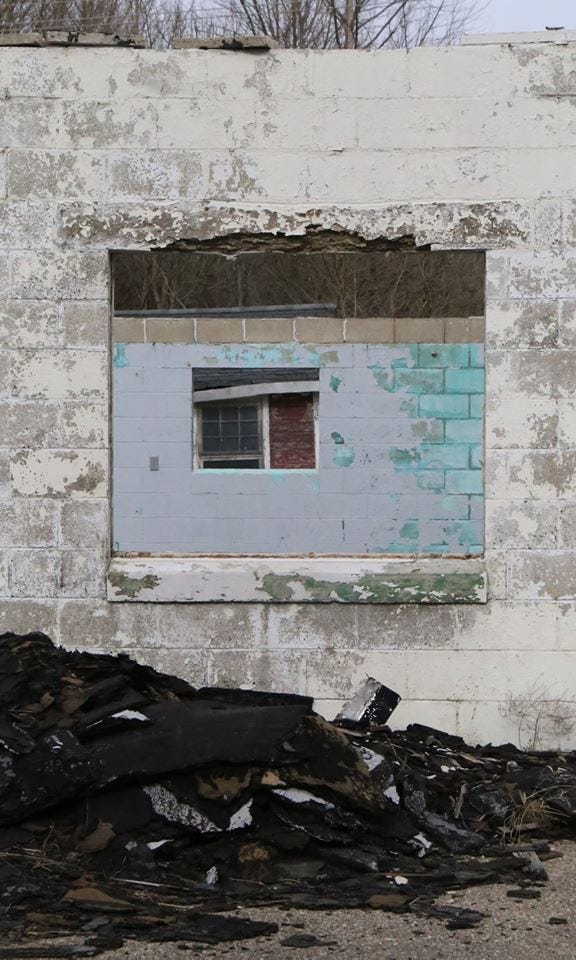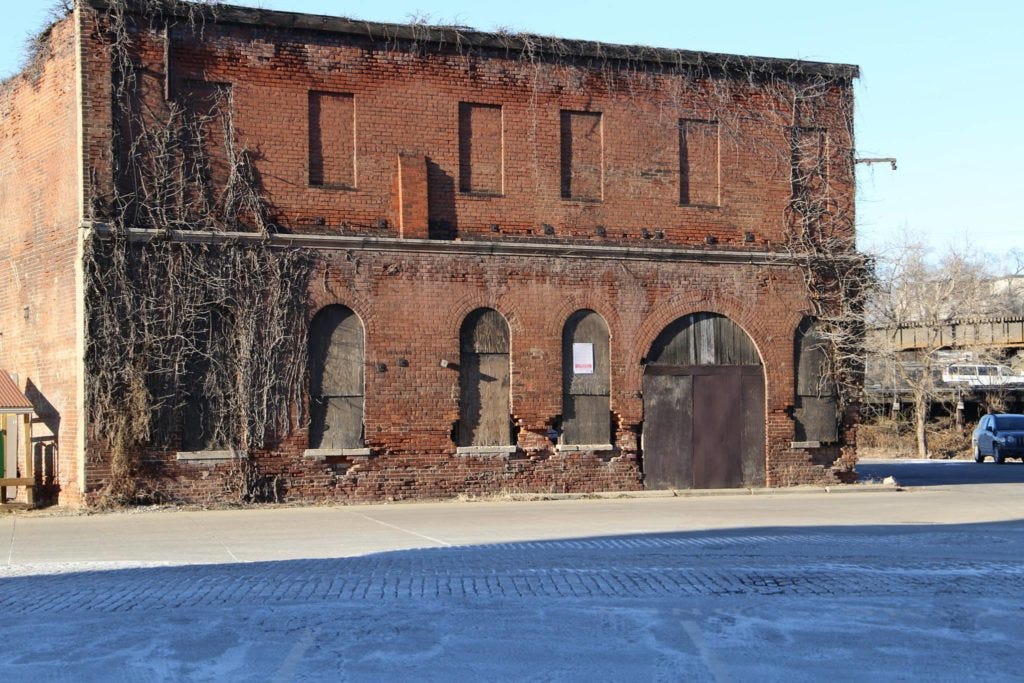Wilding Places
When the wild creeps into the human spaces, the fear crawls along with it like a wounded animal, snapping at anything that moves. From time immemorial, bandits have hidden in the forests, even if only metaphorically, and a tangle of trees and brush ignites a spark deep in the brain. An instinctive reaction to an ambush. Who knows what the shadows hold?
Blighted land, it’s called. The places where once all was orderly and productive, but with the onslaught of time, they have slipped into neglect and poverty. Abandoned places in the hearts of cities, that have become wild. Wilder than they were before the city grew over them, because as the tide of human development retreats, it leaves detritus in its wake, and the scavengers slink in, using the shadows to hide.

"RUSL never sleeps" by Mark Alger
A broken window in an empty house. The house ablaze in the night, no-one particularly concerned because it wasn’t lived in anymore, anyway. Who cares about a house no-one wanted? The morning and the wet blackened shell crouches on the lot like a lumpy beast with empty eyes and gaping jowls. In time, the city workers bulldoze it, and the land is empty again. For a little while, anyway. The tide of nature washes over it, with a predictable succession of weeds, brush, and young trees, all creating pools of shadow in which trash lurks like tiny larvae, ready to hatch out into mosquitoes. Only here, the pools also harbor sharks. Sharks with knives for teeth, and guns tucked in the sagging waistbands. Monsters in the urban ghettos are as cold-blooded and uncaring as any deepwater predator, and as attracted to the blood of the city where poverty has wounded it.

"Burned out service station" by Mark Alger
The shadows deepen, and the warm lights of nearby houses blink on. Inside those houses are families, people who live here because they must. Because even though the wilding places fill them with fear, they have no means to flee the coming shadows and the sharks that fill them up. Families who want the same thing any of us do: warmth, security, food... a chance to walk through their neighborhood without a spectre of fear nipping at their heels. They might not be able to say what they feel, or why, but still, it’s there.
The blight creeps in, and brings fear with it. But there are ways to combat the night terrors, and one is very simply to dive into the urban jungle with machete in hand - not to fight off the sharks directly, but to bring light where there were shadows. Take care of the wild tangles full of hiding places and trash, and the tense shoulders of the people who live there will begin to come down and relax again. The innate fear of the woods, a human reaction captured in tales from the dawn of time, is a fear of the dark. Of what might be hiding in the dark, waiting to pounce, and then to run back into those shadows when they are pursued, able to escape with impunity. I know I’m mixing my metaphors, sharks in dark forests, but wolves are warm-blooded and socially acceptable. Sharks are not imbued with false perceptions of loyalty and nobility the way wolves are.
And really, this is all about perception. It’s not simply the first broken window on the empty house, or the first dropped piece of litter that swells into a tide of filth, crime, and malaise. It’s about how the neighborhood sees itself. Clean areas foster the light, and eliminate the lurkers in shadows. Hacking down the jungle to replace it with gardens, picking up the trash, working in tandem with others, these things create a certain glow that banishes fear... and as that happens, crime rates drop.
Without hope, why bother pushing back against the sharks who are constantly circling, looking for blood, for the young and the weak and the injured? Not, that’s not just wolves that hunt in that fashion - a school of fish presents a solid wall to the predator, just like a herd of bison does. But the human crowd loses the children who are hobbled by broken homes and parents who have succumbed to addiction. The injured are those who learn to self-medicate their mental illness with drugs and alcohol. And the lame and halt fall to the sharks, some becoming sharks themselves.
The rehabilitation of an empty lot is more than simply making a wasteland into productive, beautiful space again. It is a metaphor, however unconscious, for the wakening of the human heart to hope. Hope is a small thing, with feathers, and it takes wing in the light. Huddled in a nest all through the night, when dawn begins to break, it can sing and soar again. It’s a small thing, mowing and picking up trash, and mending the small broken bits. But it makes a real difference, and it’s worth doing.

"Old warehouse" by Mark Alger
And a big thanks to my friend and fellow author, Mark Alger. He generously allowed me to choose some of his urban photos to illustrate this essay. He's not only a good photographer, he's a good writer, and you should check out his fun work at his Baby Troll Blog. Hey, Mark, we should do some urbex together when you have time...




